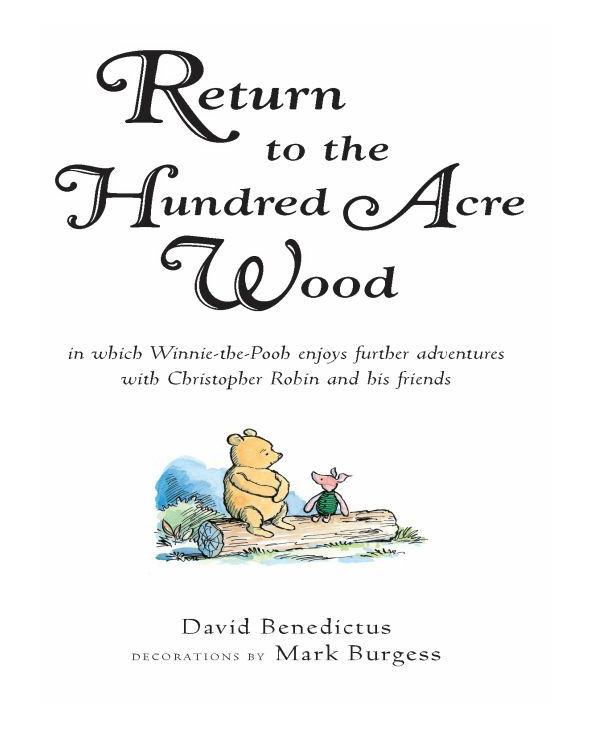
Return to the Hundred Acre Wood
Winnie-the-Pooh
فرمت کتاب
ebook
تاریخ انتشار
2009
Lexile Score
940
Reading Level
4-6
ATOS
5.6
Interest Level
4-8(MG)
نویسنده
Mark Burgessشابک
9781101149492
کتاب های مرتبط
- اطلاعات
- نقد و بررسی
- دیدگاه کاربران
نقد و بررسی

October 19, 2009
Christopher Robin returns from boarding school (80 years later) in this authorized but largely forgettable third volume of stories about Pooh, Piglet and the denizens of Milne's famous forest. Missing is the charm of the first book, mediated by an adult narrator creating a tableau for his child's imaginative play with a coterie of stuffed friends. Like the first books, there are 10 stories, but they are aged up to reflect Christopher's new interests—the play here involves a spelling bee, cricket, the creation of a school, the use of a thesaurus, atlas, dictionary, etc. A new character, Lottie the Otter, joins Rabbit and Owl to make a trio of the sanctimonious. Even saintly Kanga—Kanga!—loses her patience with Roo. There are a few inspired moments, including Rabbit's ill-conceived plan to lure his Friends and Relations to participate in a census using carrots and shortbread. (Rabbit also gets the best line: “Happy may be all very well, Eeyore, but it doesn't butter any parsnips.”) Burgess's illustrations are serviceable and resemble the originals, but, again, topping Shepard's originals proves a tough act to follow. All ages.

January 1, 2010
Gr 1-4-Eighty years after the publication of the original "Winnie the Pooh" stories, this authorized sequel returns readers to the familiar characters and locales. Christopher Robin, on holiday from school, rejoins Pooh, timid Piglet, bouncy Tigger, patient Kanga, and his other friends for a summer full of adventure. In 10 stories, the friends put on a spelling bee, conduct a census, search for disappearing bees, start a school, and host a harvest festival. During a drought, they also meet a new resident of the forest, Lottie, an otter who is both forgetful and obsessed with etiquette. Another chapter, which describes a cricket match, may be more challenging for American readers. Fans of Pooh will recognize many elements: Pooh's hums, the animals' creative spelling, Piglet's fear of Heffalumps, and the maps on the endpapers. What's different is Christopher Robin; a year older, he seems less innocent, more in the role of an older sibling than a playmate. In addition, most members of the large cast of characters appear in each chapter, which feels a bit overwhelming. The writing is warm and humorous, though it doesn't quite match the charm and whimsy of the originals. Burgess's watercolor illustrations, on the other hand, are quite reminiscent of Shepard's. Pooh purists may find fault, but the book will likely be popular with many young readers and their parents."Jackie Partch, Multnomah County Library, Portland, OR"
Copyright 2010 School Library Journal, LLC Used with permission.

November 1, 2009
Grades 2-4 Its been 80 years since A. A. Milne hinted that Christopher Robin had to grow up and leave the Hundred Acre Wood, but Benedictus does away with the decades with a nifty bit of magic: Lets call it eighty seconds, says Pooh in an introduction, and then itll be as though no time has passed at all. Indeed, readers moving on from The House at Pooh Corner (1928) will not notice the interruption. That said, Christopher Robin is not exactly the same. Hes quite tall these days, and goes on about boarding school and playing cricket. The woods are a place, it seems, that he needs less now than in the pastbut that doesnt diminish the imaginary three months he spends adventuring with his kindhearted but daft friends (including new addition Lottie, an egotistical otter). Ten chapters, copiously illustrated by Burgess in the miniature manner of Ernest H. Shepard, detail unthreatening events ranging from spelling bees to tea parties. Though the tales can underwhelm when isolated (aside from the near-perfect chapter in which Tigger fantasizes about Africa), the cumulative effect is a warm jumble of happy memories. Its both surprising and comforting that tales of such soft tenderness are still relevant.(Reprinted with permission of Booklist, copyright 2009, American Library Association.)

























دیدگاه کاربران